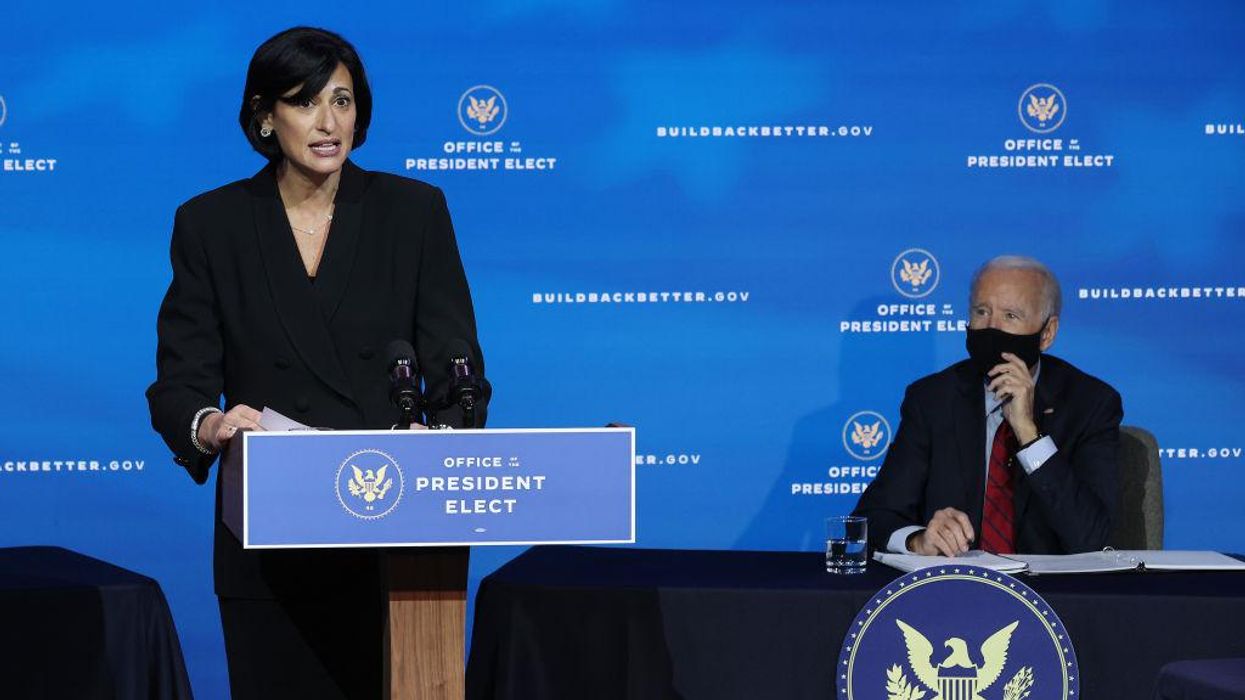
Chip Somodevilla/Getty Images

The CDC will use COVID-19 funding to make 'new and expanded investments in racial and ethnic minority communities'
The Centers for Disease Control and Prevention declared that racism is a "serious public health threat." Dr. Rochelle Walensky, the director of the CDC, released a statement on Thursday claiming that racism "affects the health of our entire nation."
Walensky, a prominent figure in the Biden administration's coronavirus response, noted that millions of Americans were infected with coronavirus and others suffered during the COVID-19 pandemic. Walensky added, "These painful experiences and the impact of COVID-19 are felt, most severely, in communities of color—communities that have experienced disproportionate case counts and deaths, and where the social impact of the pandemic has been most extreme."
The director of the influential U.S. health agency stated, "The pandemic illuminated inequities that have existed for generations and revealed for all of America a known, but often unaddressed, epidemic impacting public health: racism."
"What we know is this: racism is a serious public health threat that directly affects the well-being of millions of Americans," Walensky continued. "As a result, it affects the health of our entire nation."
Walensky highlighted "social determinants of health," which the CDC defines as "conditions in the places where people live, learn, work, and play that affect a wide range of health and quality-of life-risks and outcomes." The CDC alleges that social determinants of health are "key drivers of health inequities within communities of color, placing those within these populations at greater risk for poor health outcomes."
Walensky, who is also the administrator of the Agency for Toxic Substances and Disease Registry, said, "These social determinants of health have life-long negative effects on the mental and physical health of individuals in communities of color."
"Over generations, these structural inequities have resulted in stark racial and ethnic health disparities that are severe, far-reaching and unacceptable," the CDC director said. "As the nation's leading public health agency, CDC has a critical role to play to address the impact of racism on public health."
Walensky announced that the health agency would study the "impact of social determinants on health outcomes, expand the body of evidence on how racism affects health, and propose and implement solutions to address this."
"The word racism is intentional in this [initiative] for the CDC," Walensky told Time magazine, adding that health equity would be a priority during her directorship. "It has to be baked into the cake," Walensky said. "It's got to be part of what everybody is doing."
The CDC announced it will use COVID-19 funding to make "new and expanded investments in racial and ethnic minority communities and other disproportionately affected communities around the country, establishing a durable infrastructure that will provide the foundation and resources to address disparities related to COVID-19 and other health conditions."
The health agency will also ramp up efforts to provide a diverse, inclusive, and affirming environment for everyone.
The CDC also unveiled a new section of its website titled "Racism and Health," which "will serve as a hub for the agency's efforts and a catalyst for greater education and dialogue around these critical issues."
"The data show that racial and ethnic minority groups, throughout the United States, experience higher rates of illness and death across a wide range of health conditions, including diabetes, hypertension, obesity, asthma, and heart disease, when compared to their white counterparts," the site states. "Additionally, the life expectancy of non-Hispanic/black Americans is four years lower than that of white Americans."
"To build a healthier America for all, we must confront the systems and policies that have resulted in the generational injustice that has given rise to racial and ethnic health inequities," the health agency said. "We at CDC want to lead in this effort—both in the work we do on behalf of the nation's health and the work we do internally as an organization."
The CDC also features a "Health Equity" page, which has subsections of "Minority Health," "Diversity and Inclusion," and "Women's Health." The CDC says that "reducing and eliminating health disparities is fundamental to reaching health equity and building a healthier nation."
In July, the Minneapolis City Council approved a resolution that declared racism a public emergency. Following the death of George Floyd, Minneapolis passed the resolution, which states: "Racism in all its forms causes persistent discrimination and disparate outcomes in many areas of life, including housing, education, health, employment, public safety and criminal justice; exacerbated further by the COVID-19 pandemic crisis."
The Vermont city of Burlington also declared racism a public health emergency in July. The city announced the "Community Declaration of Racism as a Public Health Emergency," which would "commit to coordinate our work and participate in ongoing joint action, grounded in science and data, to eliminate race-based health disparities and eradicate systemic racism."
In December, racism was deemed to be a public health crisis in Louisville, Kentucky.
Overall, 190 cities, counties, and states have declared racism to be a public health issue, according to the American Public Health Association.